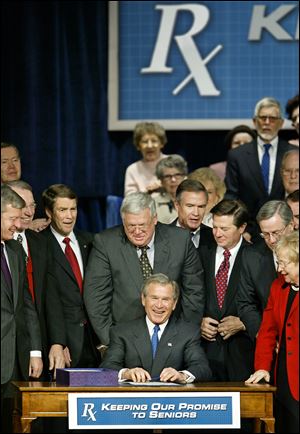
Republicans split on entitlements
Candidates like GOP-created drug benefit, but not Obamacare
9/20/2011
On Dec. 8, 2003, President George W. Bush signed into law the most far-reaching changes in Medicare since its inception.
WASHINGTON — Republicans want to pull the plug on the health care overhaul they call “Obamacare,” blaming it in part for the United States’ ballooning budget deficit.
But they’re quiet when it comes to the Medicare drug benefit, another massive health care entitlement, with unfunded future costs over $7 trillion.
Arguably, it could be driving up the deficit more than President Obama’s ambitious health care plan.
But when the Republican presidential candidates were asked last week if they would repeal the Medicare drug benefit, they said no way. After all, Republicans created it.
Debt and deficit are the focus of the Republican Party as the 2012 presidential campaign moves through the nominating process and looks ahead to the general election. Yet the reluctance of GOP candidates to renounce a costly entitlement program that voters like shows how politics can come into play when critiquing the federal ledger.
Passed by a GOP-led Congress in 2003 under President George W. Bush, the prescription program is immensely popular with older people, faithful voters who lately have been trending Republican.
Medicare recipients pay one-fourth of the cost of the drug benefit. Because there’s no dedicated tax to support the program, the rest comes from the government’s general fund. That’s the same fund used for defense, law enforcement, education, and other priorities. It’s regularly refilled with borrowed dollars that balloon the deficit.
The health care law costs far more than the drug benefit but is paid for, at least on paper. It includes unpopular Medicare cuts and tax hikes on insurers, drug and medical device companies, upper-income people, and even indoor tanning devotees.
Asked last week at the Tea Party debate whether they would repeal the prescription program, GOP candidates would hear nothing of it.
Texas Gov. Rick Perry said he would not, even though he said he’s concerned about its cost. Cracking down on waste and fraud might be the answer, he suggested.
“I wouldn’t repeal it,” said former Massachusetts Gov. Mitt Romney. He said he would restructure Medicare, but not for those now in the program or nearing retirement.
Texas Rep. Ron Paul noted he’d voted against the prescription benefit but said repeal “sure wouldn’t be on my high list. I would find a lot of cuts [in] a lot of other places.”
Budget hawks scoff.
“I’m an equal opportunity critic,” said David Walker, a former head of the Government Accountability Office, the congressional watchdog agency. “I think the Republicans were irresponsible for passing the Medicare prescription program in 2003, and I think the Democrats were irresponsible for passing” Mr. Obama’s health overhaul.
Mr. Walker now leads the Comeback America Initiative, a nonpartisan group promoting fiscal responsibility.
“There was no attempt to offset the cost of the Medicare prescription bill,” he said. “It’s fair to say that at least there was an attempt to pay” for the health law through a mix of spending cuts and tax increases.
How big is the hole left by the prescription program?
Over the next 75 years, its $7.5 trillion “unfunded obligation” exceeds the $6.7 trillion gap attributable to Social Security.